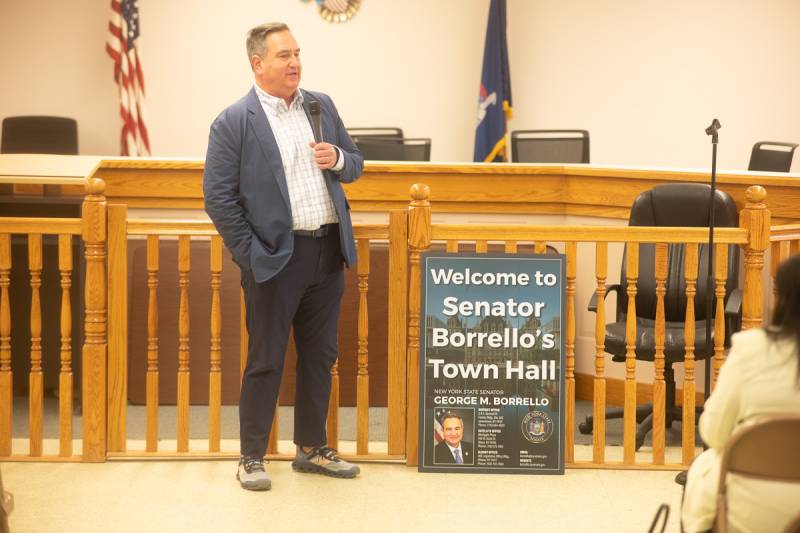
Photo by Howard Owens.
Expansion of healthcare services, the limited number of dialysis clinics in the region, Medicaid expenditures, and naturopathic medicine — healthcare topics were top of mind for many in the audience of Wednesday's Town Hall Meeting in Darien, hosted by State Senator George Borrello.
The first speaker was a man named Tim who said that when his kidneys failed, his wife donated one of her kidneys to him, and that required him to be on dialysis for 18 months. It was hard, he said, to access clinics in the area. There had been one in Mount Morris, he said, but when the doctor left, the clinic closed.
Borrello, representing the 57th Senate District, said he's discussed the clinic shortage with providers and the biggest issue isn't a lack of willingness to expand -- hiring doctors is a major issue, and Borrello blamed the state's arcane licensing system.
"We have this ridiculous, long process of actually licensing those folks as if somehow being a doctor in Pennsylvania is so much different than being a doctor in New York," Borrello said. "One time, it took us a year and a half to get a surgeon who wanted to move from Pennsylvania, who had been practicing for 16 years as a surgeon, to New York to go practice only. In general, it took a year and a half to get through the red tape of the state government. My point is that we make it more difficult for people who want to get into that profession to come here."
Chetna Chandrakala, chief financial officer for Oak Orchard Health, asked Borrello to support a proposal that is currently part of the state budget bill that is designed to increase federal Medicaid reimbursements by restructuring the tax on health insurance. Health insurance providers would be reimbursed for the tax from the increased federal funding, so the proposed tax would not affect premiums for Medicaid and Essential Plan programs. However, it could result in a small increase for private plans. The proposal could generate $50 million for Federally Qualified Health Centers, allowing for expanded services and fee schedule increases (more information).
Chandrakala acknowledged the people seeking an increase in services and said, "We want to be able to provide that help, that medical help, but health centers are not getting the rate increases."
Borrello expressed frustration that out of a $260 billion state budget, not enough is being done to assist the people in the state who most need help paying for healthcare.
"Some of the most vulnerable people in our communities -- senior citizens, those with chronic disease, people with mental health issues, and the developmentally disabled are not getting enough help," Borrello said. "So, where is all this money going if it's not going to those folks? Yes, we should --your reimbursement rates should be increased. And there is certainly money to do that."
Borrello said that former Gov. Andrew Cuomo cut Medicaid payments, and Gov. Kathy Hochul has tried addressing the issue, but it hasn't been enough to keep pace with inflation.
One issue plaguing Medicaid, Borrello said, is what an organization known as the Empire Center has identified as the "missing million."
Since the passage of the Affordable Care Act, the percentage of New Yorkers getting at least some of their healthcare coverage through Medicaid has increased to 37% of the population.
In 2022, Empire Center determined that there were 6.6 million people enrolled in Medicaid and another one million on the Essential Plan; however, Census Bureau data indicates only about 5.5 million New Yorkers are income eligible for any level of Medicaid assistance, so enrollment was two million higher than the demographic estimates would suggest, with about one million of that excess being attributed to Medicaid.
The Empire Center urged lawmakers to investigate the disparity to ensure Medicaid eligibility guidelines are being properly enforced. Some of the people in that missing million could be people who purchase health insurance through the Marketplace but pay the premiums without any Medicaid coverage.
"Empire Center FOILed the qualifications for all people on Medicaid, and the Department of Health, particularly the division of Medicaid, refused to respond to that full request for over a million people," Borrello said. "That means there are a million people in New York we can't prove actually exist that are qualified. If we cut that alone, we could give you all the money you needed."
A naturopathic medicine provider, who provided a first name of Michael, asked Borrello to support a bill that would provide licensing in New York for naturopathic doctors.
Borrello said that while he wasn't familiar with the current proposed legislation, he supports the idea in concept.
"On the surface, I would say I would support that. The more people who are providing more diverse medical health and advice, I think, is a good thing," Borrello said.
He acknowledged that there may be opposition from associations representing doctors and nurses, and they may have good reasons to lobby against the bill, but that doesn't mean there can't be negotiations and compromise.
"There's got to be a way to find a common ground there to see if there is some kind of modification that will allow it to happen," Borrello said.
While issued at the national level are outside of a state senator's job description, Borrello agreed to address questions about those issues, as well.
On other topics, one person asked how voters could help fight the "progressive movement" in the state.
"You know, I think the vast majority of New Yorkers all want the same thing," Borrello said. "They want to be able to live affordably and safely here in New York State. And there is definitely this far-left progressive movement that's based in New York City that is pushing back against that. And the best way to fight is to help educate your friends and neighbors across the state, people that you know."
He said nearly everybody belongs to some statewide association that enables them to interact with people around the state, and Upstate residents should use those networks to help inform others about the impact of progressive policies.
On the proliferation of solar farms in Upstate, Borrello called the initiative a "green energy scam."
"This is not about climate change," Borrello said. "This is about money. Some folks on Wall Street figured out about a decade ago, this is a guaranteed return on their investment. 'Why should we risk our money in the market when we're guaranteed a return on investment courtesy of the taxpayers?'"
He said none of these farms would get built anywhere in the nation without taxpayer subsidies because there is no profit in wind and solar.
The statement is partially true.
Warren Buffett has said, “We get a tax credit if we build a lot of wind farms. That’s the only reason to build them. They don’t make sense without the tax credit.”
However, recent analyses show that the cost of building new wind and solar farms is now competitive with, or even lower than, building new fossil fuel plants—even without subsidies. For example, Bloomberg New Energy Finance and Lazard both report that, on an unsubsidized basis, new wind and solar projects can be as cheap or even cheaper than new natural gas or coal plants in many regions of the United States.
The topic of guns came up, with one person complaining about the difficulty of getting a pistol and wondered why the state "caters" to people who oppose gun rights.
"You know, we live in a blue state, right? And even though, if you look at the map, most of the state is red, the high population centers are blue, and that's where most of the leadership comes from," Borrello said. "They absolutely cannot stand the Second Amendment."
He said the state's leadership is trying to kill gun rights by a thousand cuts.
"The most recent thing was background checks for ammunition purchases, all these ridiculous things that, in the end, really aren't stopping any crime," Borrello said. "If you could say, 'Yeah, look, crime is plummeting in New York State thanks to all these gun laws.' But that's just not true. Crime is up, so restricting the rights of law-abiding citizens is the goal."
The ammunition background check was initiated in 2023, and so far, only 0.55% of transactions have been denied.
In 2024, crime in New York City declined by 3%. Statewide, since the pandemic, homicides in the state have declined by 53%. Gun violence declined by more than 26% in 2024 compared to 2023. Those stats do not necessarily prove that any particular gun law is contributing to the reduction, as there may be other social and economic factors at play.
One person praised the effort of DOGE, the controversial Elon Musk-initiated effort to reduce the size of the federal government, and asked for a similar effort in New York.
Borrello said he is supporting a bill to create a Commission on Government Efficiency. He said it would operate differently from DOGE because it would be a commission that would investigate waste.
"It would be made up of folks who are already in the system," he said. "I think it's a good idea. Like I said, there is so much money being wasted."
To those who said they were unhappy about the elimination of the federal Department of Education, Borrello said he was a strong supporter of public schools and that it was his understanding that while the DOE was being closed, its essential funding, such as Title 1, would remain.
The Town Hall wrapped up on a friendly note with a self-professed socialist endorsing any potential run by George Borrello for Congress.
"My name is Sam, and I live in Genesee County," Sam said. "I grew up here. I am a card-carrying socialist, and I want to say that out loud in this room, because I own a gun. There's a gun under my bed. I hunt. My husband is going to a gun safety course on Saturday run by socialists. So I think it's important to close the divide a little bit. We are not the evil left, and you are not the evil right. In fact, if you were to run for Claudia Tenney's spot, who won't answer emails, who refuses (to attend) town halls, who will not hold town halls, I would vote for you."
Borrello said he appreciated the comment.
"Here's the thing, folks, and maybe we'll close on this, what divides us is so small compared to what unites us, and we've kind of forgotten that," he said. "I mean, we've got to try to figure out the things that separate us and how we can at least agree to disagree. We used to be able to agree to disagree. That was what made America different from every other country in the world, because in other countries, when you disagree, it's time to go to war. We had the ability to agree to disagree, and we've lost that. I'd love to see us try to get back to that. I'd love to have a friendly conversation and discuss the things that we agree on and disagree on, and then agree to disagree."
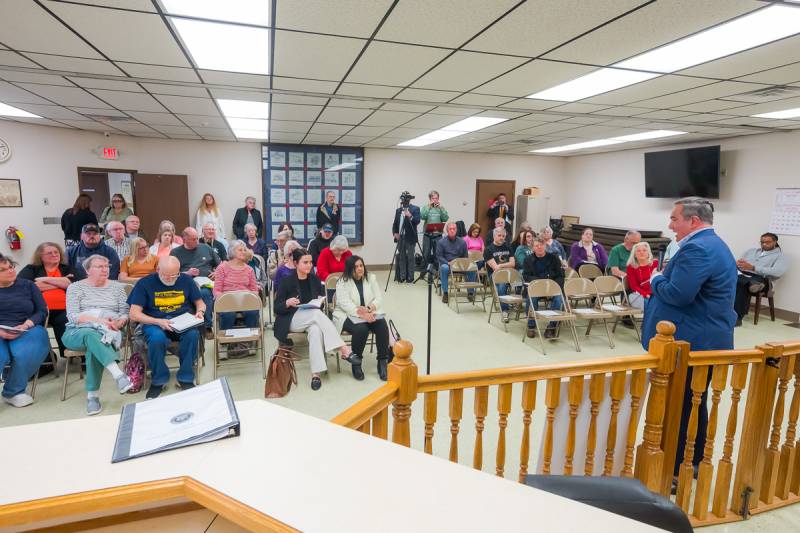
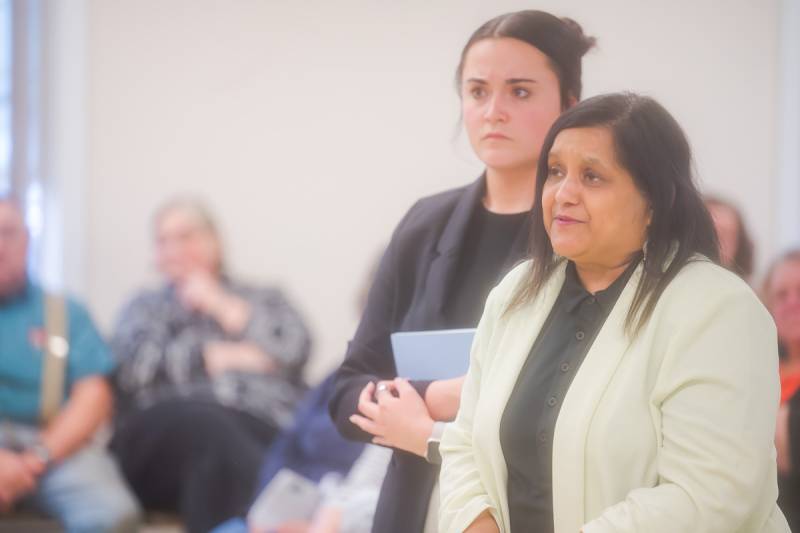
Photo by Howard Owens.
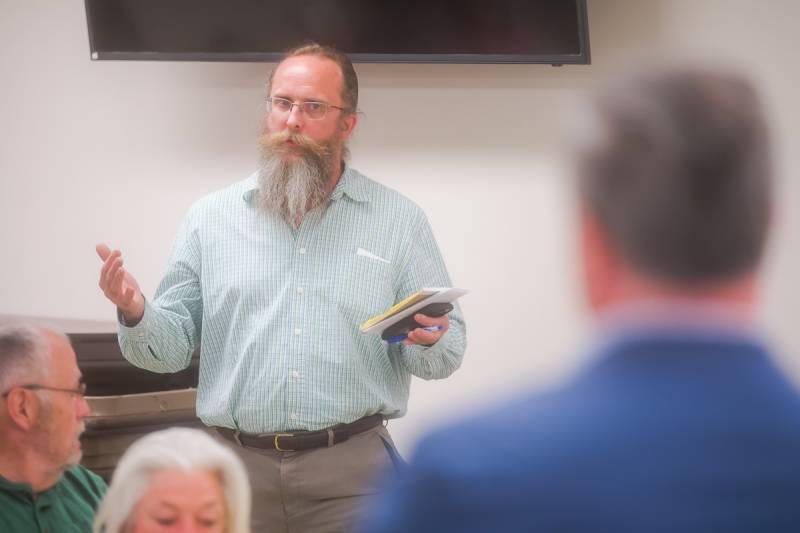
Photo by Howard Owens.
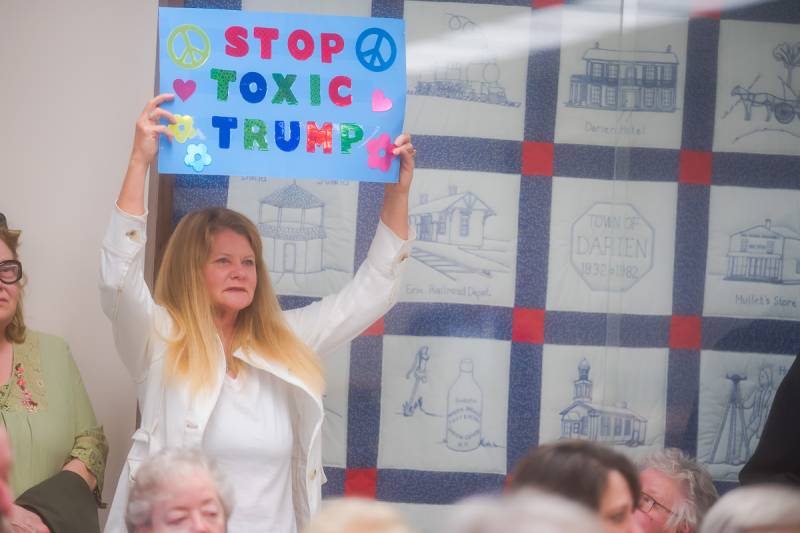
Photo by Howard Owens.
